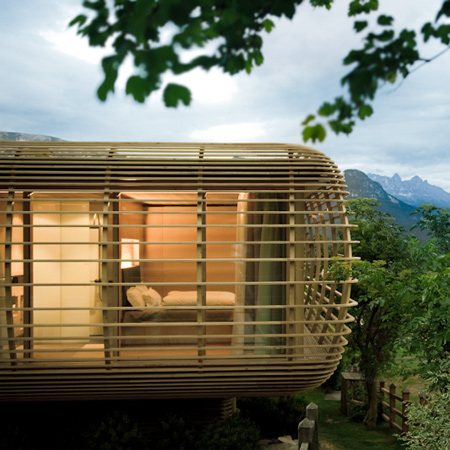
Fincube by Studio Aisslinger
Berlin designer Werner Aisslinger of Studio Aisslinger has completed a small mountainside mobile living unit in Ritten, Italy.
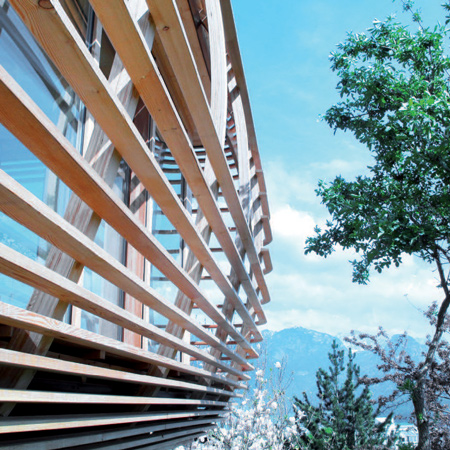
Top image is by Florian Berger
Above photograph is by Studio Aisslinger
Called Fincube, the house is glazed on all sides, affording views over the Dolomites, and clad in wooden louvres made of local timber.
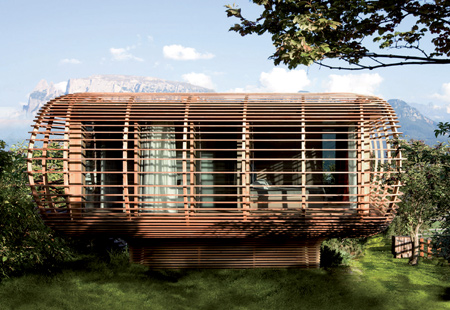
The house has a small footprint of 2 square metres and is designed to be easily taken apart and rebuilt in a new location.
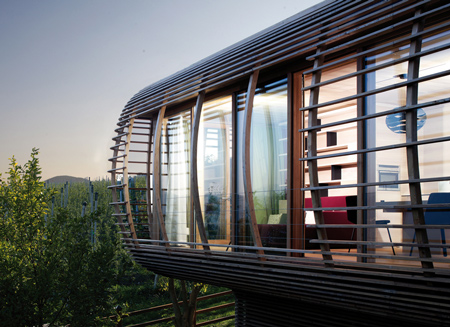
Renderings are by Steffen Joenicke except where stated otherwise.
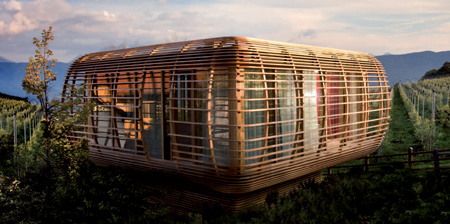
The following information is from the designer:
FINCUBE
A vision of temporary living
Ñatural high-techì is the concept of this new modular, sustainable & transportable low-energy house. Designed by Werner Aisslinger and developed with a South Tyrolian team, the FINCUBE was created 1200m above sea level near Bozen in Northern Italy, with a brilliant view of the famous Dolomite mountains. The hideaway-in nature nomadic housing concept is since recently exhibited as a prototype in Ritten, above Bozen.
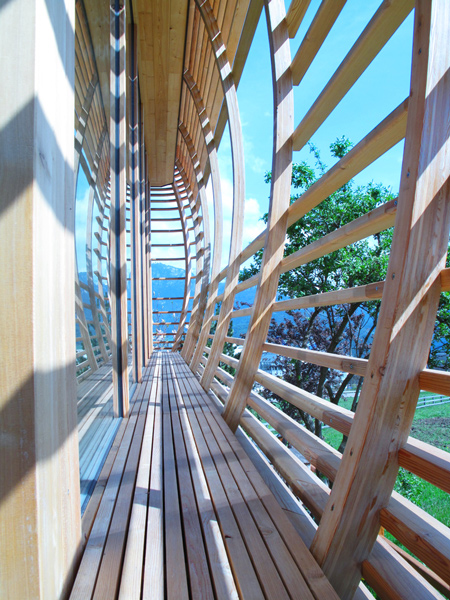
Above photograph is by Studio Aisslinger
Sustainable Nomadic House:
Made entirely of local wood, the building provides 47 m≤ of living space with a minimal CO2 footprint: local suppliers and local crafts using local long-lasting and recyclable materials manufactured with the precision and care of tyrolese handwork. The FINCUBE is a materialized vision of a small housing unit with a long life cycle.
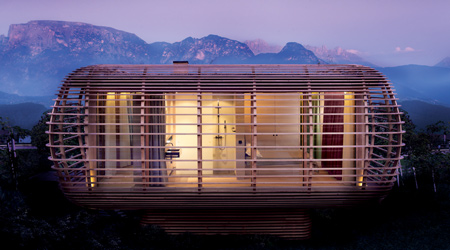
It can easily be dismantled and rebuilt on a new site, and even more important for nature hideaways: it requires minimum soil sealing - just 2 m2 that are easily re-natured after the FINCUBE is moved to another location.
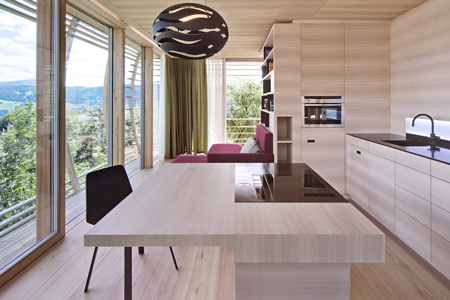
Above photograph is by Hannes Meraner
Long-lasting Design:
The design is minimal, material-orientated, and in close touch with nature - the wooden space with a 360-degree triple glazing is furnished with a second facade layer, producing shade and giving the building a unique overall mushroom-like mono-shape.
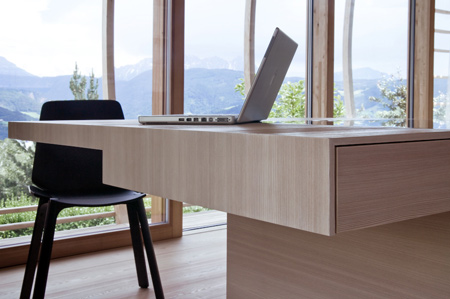
Above photograph is by Hannes Meraner
The horizontal ledges give privacy to the FINCUBE and embed the building into forests, meadows, mountain sides or any nature resorts. The combination of long-lasting design and the option of changing its location after a while make the FINCUBE a flexible home or hideaway and a lifetime companion.
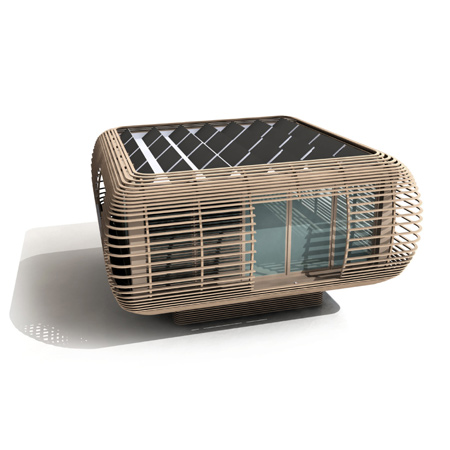
Above image is by Studio Aisslinger
Hospitality Vision:
Together with South Tyrolean hotelier Josef Innherhofer, the Fincube was also conceptualized as a vision for future hospitality: a temporary FINCUBE village with minimum soil sealing can be placed in the middle of the most beautiful landscapes without permanently altering them. In contrast to all permanent buildings it could be easily changed, extended, scaled down or removed and the area would soon be re-naturalized back to normal. These qualities turn the unit into an answer to future needs of flexible and smart tourism.
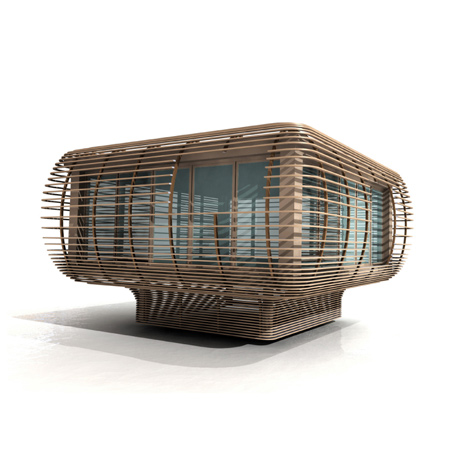
Above image is by Studio Aisslinger
Technology & Space:
Technology wise the FINCUBE is a smart house - all vital house-functions are controlled by a central touch panel. The supporting structure is made of local larch and the interior is a combination of larch & stone-pine. The 3m-high space is organized in a helical structure: the entrance area blends into a generous open kitchen with an adjacent sofa living space, around the corner one enters the bedroom and further down is the spacious bathroom.
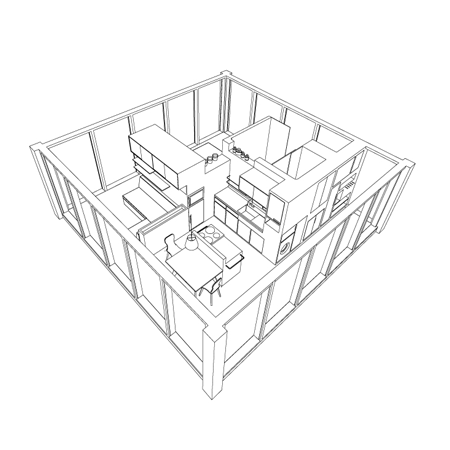
Above image is by Studio Aisslinger
PROJECT
Design: Werner Aisslinger - Berlin .
Interior design: Tina Bunyaprasit, Studio Aisslinger .
Styling: Studio Aisslinger - Berlin
Investor: Josef Innerhofer - Bozen, Italy
Wood structure: Markus Lobis - Ritten, Italy
Interior finish: Matthias Prast - Ritten, Italy